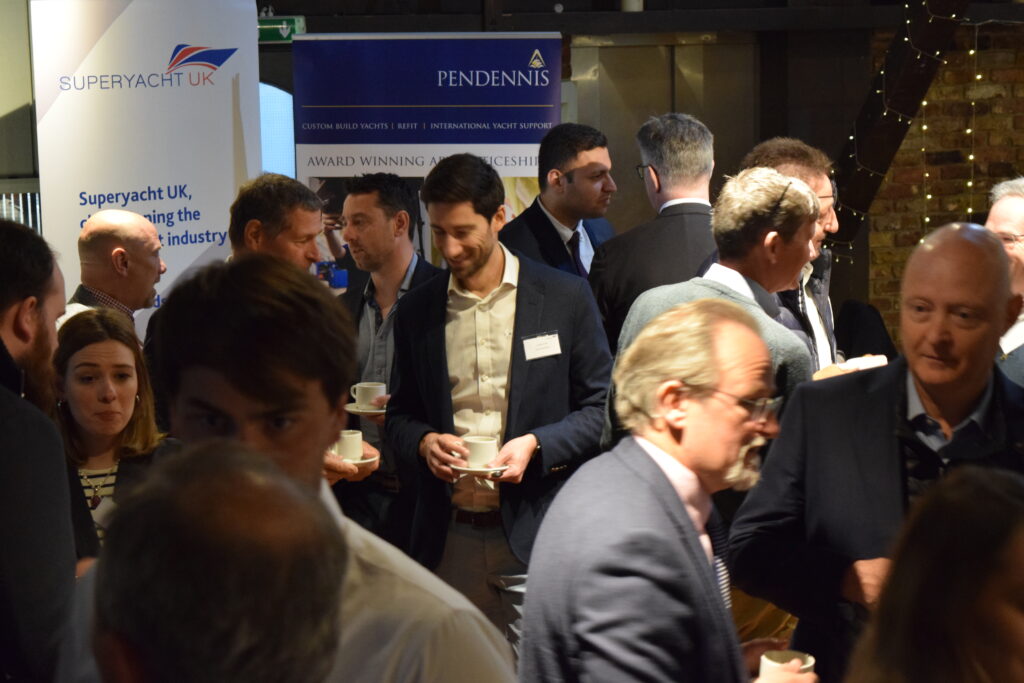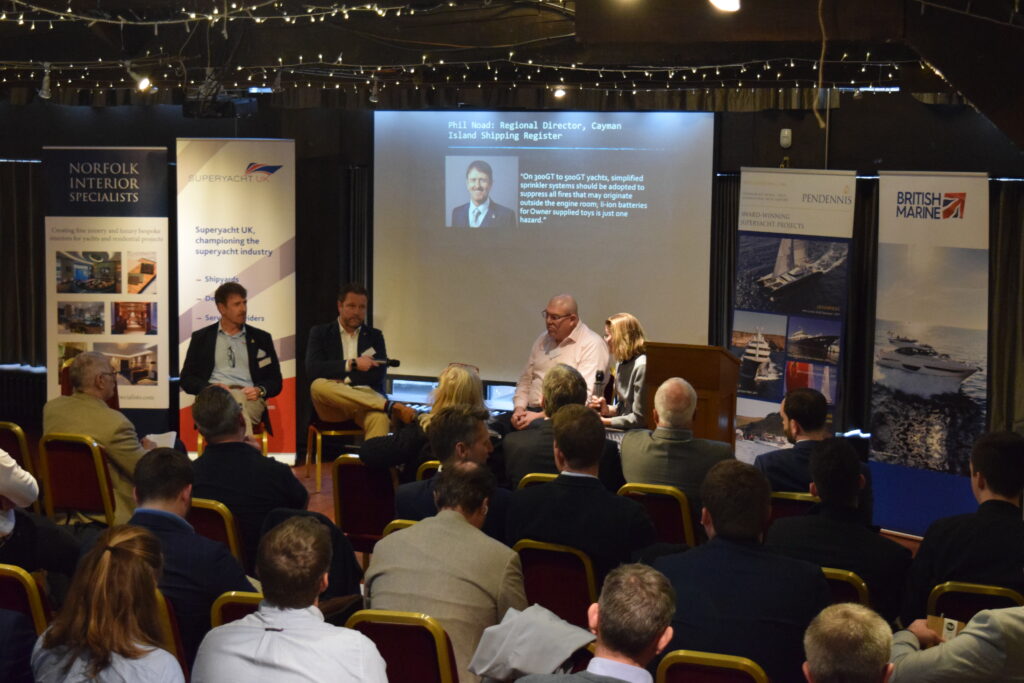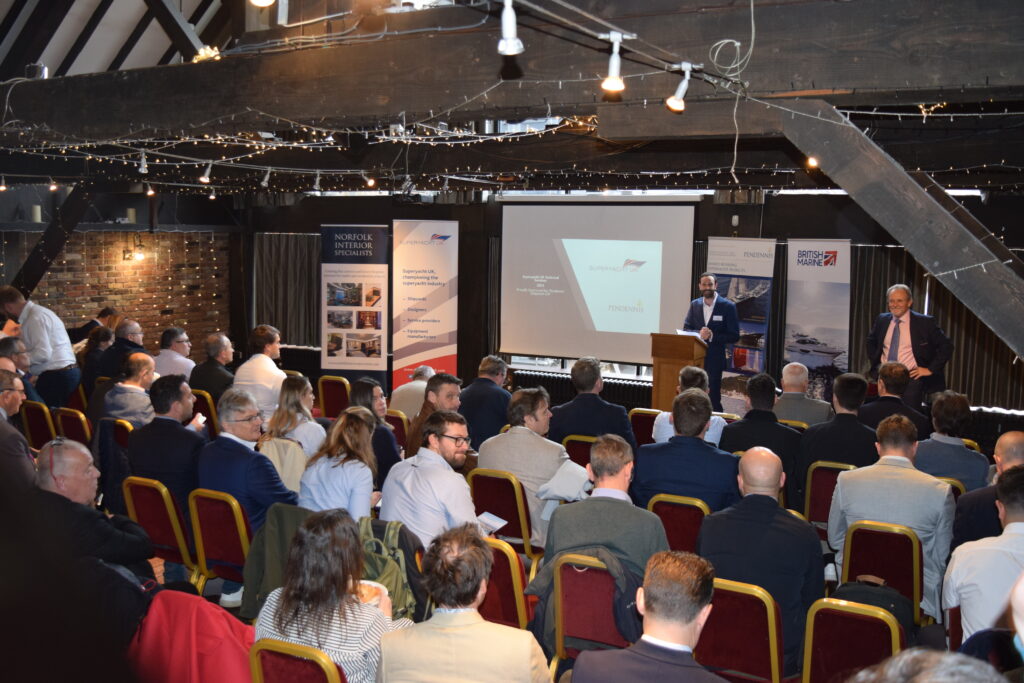
Superyacht UK Technical Seminar dissects sector’s headline issues
The annual Superyacht UK Technical Seminar has recorded positive feedback and a strong turnout, after the event concluded at London’s St Katharine Docks.
Over 85 delegates from across the superyacht sector, insurance and legal fields and members of the press attended the event on 18 April to hear from leading industry professionals discussing the headline issues affecting the sector. The agenda covered topics ranging from regulatory changes and sustainability challenges to the impact of lithium-ion (Li) batteries and alternative fuels.
Following an address by SYUK chairman Stephen Hills, the day got underway with a look at the latest amendments to the revised Red Ensign Group, large yacht code. Phil Noad from the Cayman Island Shipping Register led the session and advised that following several industry working group discussions over the last year the revised code is set to be published in 2024, which will include an updated annex looking at Li battery risks.
Giles Barkley, Faculty of Creative Industries, Architecture and Engineering course leader at Solent University, then provided an overview of new qualifications available for the UK’s Superyacht design industry and of the Solent University’s master’s degree.

Ivo Veldhuis, technical manager of Mayfair Marine, then led a session looking at alternative fuel-hybrid electric battery propulsion systems for high-speed catamarans. The session showed that with the right data, there are feasible net zero solutions that can be implemented.
Moving into the afternoon, Vittorio Boccoloni, senior lecturer of yacht engineering at Solent University, provided an insightful talk looking at alternative fuels, including hydrogen, synthetic fuels and other alternative fuels and their place in reducing emissions in the superyacht industry by comparing how they would affect the design of a 68m superyacht.
Martin Jackson, sales manager at PME Power Systems Group, then provided an overview on MAN engine developments and outlined what is available now and will be available in the future with regards to the development of engines that reduce the emissions on the path to net zero.
Jackson was followed by Fabio Fantozzi, the regulatory approach lead at the Marine Coastguard Agency (MCA) who provided an update on the regulatory challenges surrounding alternative fuels and energy sources, and alternative certification pathways.
Ollie Taylor, associate director at Anthesis Group, responsible for spearheading the growth of its MarineShift360 Life Cycle Assessment (LCA) sustainability tool, provided information on how Life Cycle Analysis gives businesses the tools and information they need to make the most effective sustainable choices.

It was then over to Jeff Houlgrave, senior associate at Marina Projects. In an enlightening session, delegates heard about the challenges that marina and infrastructure developments are facing because of the ever-evolving design of yachts, leading to changes in facility requirements and locations for the marinas whilst pushing the available marinas and infrastructure technology to the limits.
The day concluded with the seminar’s keynote panel discussion chaired by Francesca Conn, counsel at Hill Dickinson. The session looked at how the hidden risks associated with the increased use of lithium-ion batteries are now causing the superyacht industry to look at the design and operation of vessels.
The expert panel were in agreement that although there are of course, risks associated with Li batteries, those being used in the systems of the ship have minimised risk through various design considerations, flag and class certification and that actually the statistics probably do not back the perceived risk.
The majority of the risk comes from additional toys and gadgets bought on board during the vessel’s operational life, which must be minimised through sensible management systems and training. The industry has also recognised and adapted quickly, meaning that the risks are already being managed and minimised, particularly in yachts over 500GT.

The panel also outlined that with emerging technology being developed in both gas/fire detection and firefighting specifically aimed at Li, as well as REG code updates coming soon, coupled with better awareness campaigns, the risks will diminish even further.
Throughout the day, delegates were also able to explore British Marine’s London Luxury Afloat boat show in the neighbouring marina.
“It’s been a great turnout,” said attendee Jeff Houlgrave of Marina Projects. I think more questions than answers have been provided today, and the need to look at alternative fuels, recognise the challenge and know that they are going to be super difficult to deliver in the time scale. One presentation, in particular, that had a real impact on me showed the graphic representation of how a 68-metre yacht would have the design issues for alternative fuels.”
The post Superyacht UK Technical Seminar dissects sector’s headline issues appeared first on Marine Industry News.
